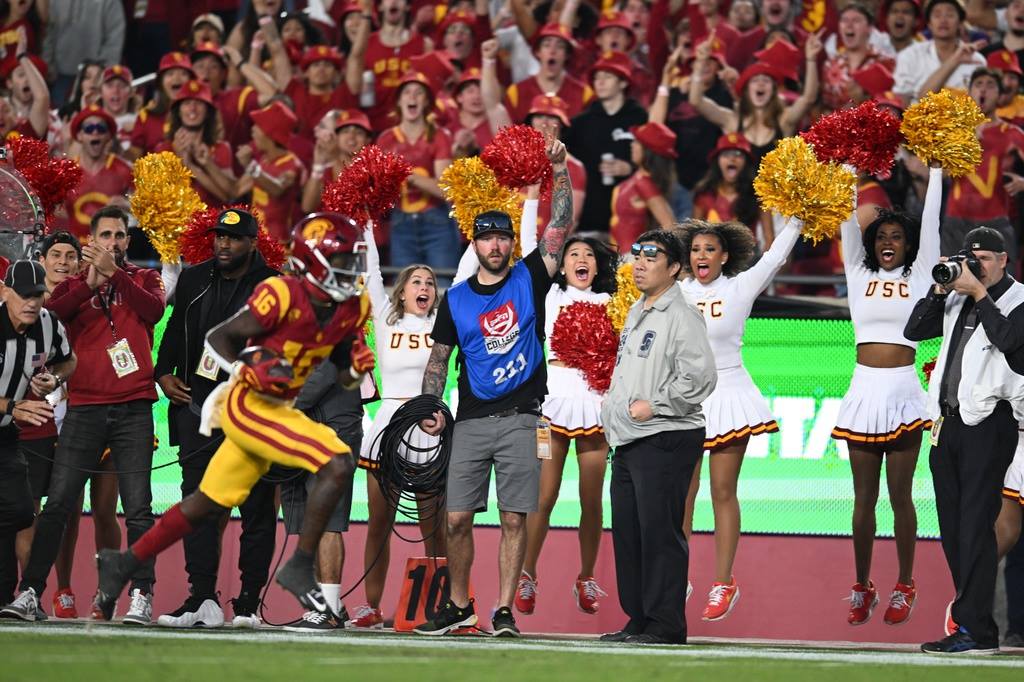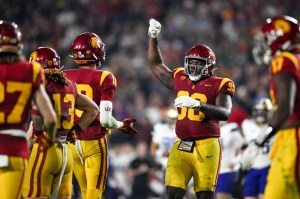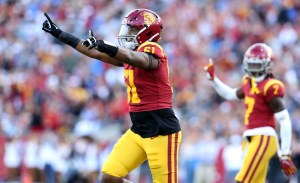The first session of a potentially earth-moving trial tied to college athlete employment status concluded on Wednesday in a labor court in Los Angeles.
The case was first filed with the National Labor Relations Board in 2022. The charging party, the National College Players Association, alleged that USC, the Pac-12, and the NCAA have misclassified USC football and basketball players as amateurs, rather than employees.
If the NCPA prevails, it will not kill college sports. But it will kill the NCAA’s business model.
After only three days of testimony, the NLRB, who is prosecuting the case on behalf of the NCPA, hasn’t yet rested its case, and the trial will resume in January. But so far, the athlete advocacy side is pleased.
“It could not have gone better,” NCPA executive director Ramogi Huma said of his case.
Here’s everything you need to know:
Inside the Courtroom
In a glorified conference room, there were a few rows of movable chairs behind desks for counsel, as well as an area for the judge and a court reporter to sit.
Just a handful of observers trickled in and out throughout the proceedings, and only a few journalists attended throughout the three days. Most attendees were working the case: two lawyers for the NLRB, and at least nine brought by USC, the Pac-12, and the NCAA, including both in-house and outside counsel.
Huma pointed out that the trial drew much less attendance than the 2014 Northwestern football player unionization case—even though this case could be just as impactful.
The Main Arguments
The NLRB’s lawyers opened by asserting that “an individual may be both a student and an employee of a university.” They also attacked the decades-old phrase of “student-athlete,” saying it “was created and has been perpetuated to deprive [college athletes] of workplace protections.”
Testimony and questioning focused on four main areas:
- How much control USC, the Pac-12, and the NCAA exert over athletes
- Whether athletes receive compensation from these entities
- Whether college football and basketball are “extracurricular”
- Whether the voluntary nature of college sports means that activities aren’t employment
Former USC football walk-ons Miles “Kohl” Hollinquest and Brandon Outlaw testified that the school controlled much of their lives, from 60-hour schedules to weekly weigh-ins and hydration tests. This, the prosecutors suggested, contradicts the idea that big-time college football was merely “extracurricular.”
“If [USC strength] coach [Bennie] Wylie hands a kid a sandwich and says ‘eat this,’ I don’t think there’s a single guy that wouldn’t,” Outlaw said. If athletes didn’t follow these rules, they were subject to various forms of group punishment.
Testimony from Hollinquest demonstrated compensation limits imposed on athletes by the school and NCAA. He received other acceptable perks, like a gift from the Pac-12 and gear and meal stipends from USC. But he was prohibited from profiting off of his own name, image, and likeness, given that he played before July 2021, when NIL rules were changed.
And while lawyers representing USC, the Pac-12, and the NCAA attempted in cross-examination to get the athletes to concede that playing college football is voluntary—to suggest that it isn’t employment—Outlaw specifically testified that he believes his current job at the XFL is also voluntary, but it’s still a job.
Cross-Examination
Ultimately, lawyers for USC, the Pac-12 and the NCAA all argued that college athletes are not employees. They attempted to establish that playing on a college football team was an educational experience that was more akin to playing high school and youth football—from practice schedules to free gear—than it was to employment. They also tried to show that the athletes in attendance joined their teams or enrolled at USC with the expectation of compensation.
But at times, lawyers for the NCAA, Pac-12, and USC appeared to contradict each other.
Even though USC’s lawyer called college football an “extracurricular activity” during opening arguments, for example, the NCAA’s lawyer engaged in a seemingly opposing line of questioning. That lawyer asked Outlaw whether he participated in any extracurricular activities at USC. His response was no.
What’s Next?
The next session will begin on Jan. 22 and run until Feb. 2. It will start with the NLRB calling adversarial witnesses and then will turn to the pro-amateurism side of the case.
If needed, the trial could continue in the final week of February, and there likely won’t be a ruling for several months afterward. It’s safe to assume that there will be a lengthy appeals process if the USC side loses.









![[Subscription Customers Only] Jun 15, 2025; Seattle, Washington, USA; Botafogo owner John Textor inside the stadium before the match during a group stage match of the 2025 FIFA Club World Cup at Lumen Field.](https://frontofficesports.com/wp-content/uploads/2026/02/USATSI_26465842_168416386_lowres-scaled.jpg?quality=100&w=1024)
![[Subscription Customers Only] Jul 13, 2025; East Rutherford, New Jersey, USA; Chelsea FC midfielder Cole Palmer (10) celebrates winning the final of the 2025 FIFA Club World Cup at MetLife Stadium](https://frontofficesports.com/wp-content/uploads/2026/02/USATSI_26636703-scaled-e1770932227605.jpg?quality=100&w=1024)








